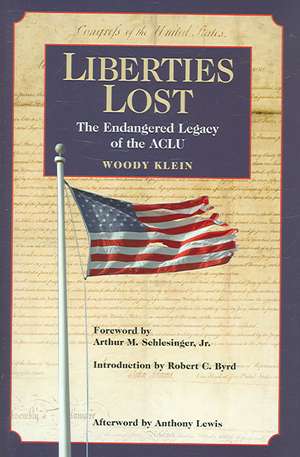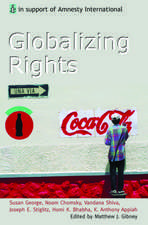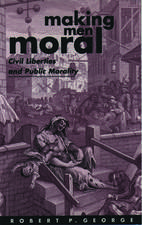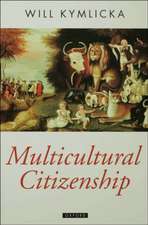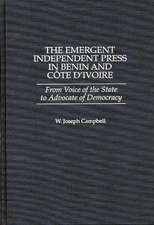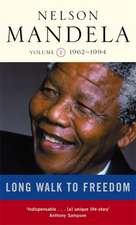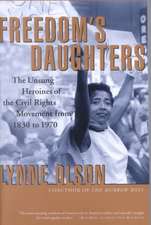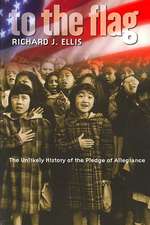Liberties Lost: The Endangered Legacy of the ACLU
Autor Woody Kleinen Limba Engleză Hardback – 29 mai 2006 – vârsta până la 17 ani
Preț: 464.32 lei
Preț vechi: 610.51 lei
-24% Nou
Puncte Express: 696
Preț estimativ în valută:
88.85€ • 92.100$ • 73.95£
88.85€ • 92.100$ • 73.95£
Carte tipărită la comandă
Livrare economică 31 martie-14 aprilie
Preluare comenzi: 021 569.72.76
Specificații
ISBN-13: 9780275985066
ISBN-10: 0275985067
Pagini: 320
Dimensiuni: 156 x 235 x 29 mm
Greutate: 0.64 kg
Editura: Bloomsbury Publishing
Colecția Praeger
Locul publicării:New York, United States
ISBN-10: 0275985067
Pagini: 320
Dimensiuni: 156 x 235 x 29 mm
Greutate: 0.64 kg
Editura: Bloomsbury Publishing
Colecția Praeger
Locul publicării:New York, United States
Caracteristici
Arthur M. Schlesinger Jr., the Pulitzer Prize-winning author of A Thousand Days, about the administration of John F. Kennedy
Notă biografică
Woody Klein is a veteran journalist, historian, and an award-winning author who has been writing about social justice and civil liberties for decades. Among his more recent books are Toward Humanity and Justice: The Writings of Dr. Kenneth B. Clark, Scholar of the 1954 Brown v. Board of Education, Decision (Praeger, 2004), and Westport, Connecticut: The Story of a New England Town's Rise to Prominence (Greenwood Press, 2000).
Cuprins
ContentsContentsContentsForeword: Human Rights Must Prevail To the EndixArthur M. Schlesinger Jr.PrefacexiAcknowledgmentsxixWoody KleinIntroduction: A Life Dedicated To Civil LibertiesxxiSenator Robert C. ByrdIntroduction To Chapter 11Chapter 1The Making of a Reformer: The Roger Baldwin Story: A Prejudiced Account by Himself5Commentary: William J. vanden Heuvel14Commentary: Alan F. Westin21Introduction To Chapter 225Chapter 2ACLU: Watchdog for the Underdog27Commentary: Anthony Romero38Commentary: Ira Glasser52Introduction To Chapter 357Chapter 3Civil Liberties in Wartime67Commentary: Russell D. Feingold81Commentary: Patrick J. Leahy84Commentary: Christopher J. Dodd86Introduction To Chapter 489Chapter 4The Courts and Equal Justice91Commentary: Edward M. Kennedy116Commentary: Norman Dorsen118Introduction To Chapter 5121Chapter 5The Government and Civil Liberties125Commentary: John Shattuck136Introduction To Chapter 6141Chapter 6Labor and Civil Liberties145Commentary: Aryeh Neier151Introduction To Chapter 7155Chapter 7Education: Key To Protecting Liberty159Commentary: Samuel Walker165Introduction To Chapter 8169Chapter 8Liberalism and Political Change173Commentary: Victor Navasky178Introduction To Chapter 9181Chapter 9Liberty and the Media185Commentary: Nat Hentoff197Introduction To Chapter 10201Chapter 10Separation of Church and State209Commentary: Rev. William Sloane Coffin Jr.216Introduction To Chapter 11219Chapter 11A World United by the Rule of Law221Commentary: Leo Nevas233Chapter 12Family Reflections: About Roger Baldwin241Carl R. BaldwinAfterword: Roger Baldwin: A Patrician Heretic245Anthony LewisAppendixAmendments to the U.S. Constitution255Selected Bibliography267About the Author and Contributors273Index277Photo essay appears following page 140
Recenzii
This book is recommended reading for all students with an interest in the history of civil liberties. Klein, journalist and historian, has assembled the views of some 20 civil liberties experts in what is essentially a tribute to the late Roger Baldwin. Although not a biography in the strict sense, it amounts to a thorough analysis of Baldwin's works as a public man dedicated almost exclusively to the defense of civil liberties in the US..Recommended. General readers, lower-division undergraduates through faculty.
[A]n optomistic and affectionate narrative suggesting that the promise of the Bill of Rights can be fulfilled in ways that are relevant in 2007--in ways that alter the balance of power without dismantling the structure of government. The beauty of the narrative is that this pragmatic and conventional approach to social and legal change is presented in a convincing manner as a radical and subversive proposition. In that vein, I think this book would be a nice resource for undergraduates. I have found it to be instructive in my teaching of Civil Rights and Liberties this semester because of various anecdotes as well as the overriding themes that augment casebooks.
In this timely book of writings, speeches and interviews of Roger Baldwin, founder and first director of the ACLU from 1920-1950, Woody Klein has woven together Baldwin's insights with comments on the state of civil liberties today from scholars, journalists, politicians and others, most of whom worked closely with Baldwin..Each chapter contains Baldwin's own observations on the importance of civil liberties in his time, which are as applicable today as when they were written, particularly with respect to civil liberties in the post-9/11 world.
Journalist and historian Klein has collected those writings of American Civil Liberties Union founder Roger Nash Baldwin (1884-1981) that he feels are most pertinent to the current debates about civil liberties in the United States. Accompanying the eleven essays are commentaries by prominent figures in today's debates, including Senators Feingold, Leahy, Dodd, and Kennedy, as well as such writers and activists as Village Voice columnist Nat Hentoff and the recently departed Rev. William Sloane Coffin. The essays provide autobiographical accounts of Baldwin's life and involvement in the ACLU and address issues which include civil liberties in wartime, the courts and equal justice, labor and civil liberties, education as the key to protecting liberty, liberalism and political change, liberty and the media, separation of church and state, and international law.
Woody Klein's new book could not be more timely. Liberties Lost, The Endangered Legacy of the ACLU appears at a point in our nation's history when more and more of us are concerned about the Bush administration's tactics in the War on Terror..While it is clear that Klein takes a dim view of the present administration's approach to civil rights, his new book is about more than the Bush administration. It offers rare insights into the life and thought of the ACLU's founder from someone who knew him well. It also includes discussions of keystone events in our nation's history such as Sacco and Vanzetti, the Scopes Monkey Trial, the internment of Japanese Americans during World War II and McCarthyism..Whether you agree with Klein's analyses or not, his new book is food for thought and a celebration of free speech at a time when we need it most.
[A]n optomistic and affectionate narrative suggesting that the promise of the Bill of Rights can be fulfilled in ways that are relevant in 2007--in ways that alter the balance of power without dismantling the structure of government. The beauty of the narrative is that this pragmatic and conventional approach to social and legal change is presented in a convincing manner as a radical and subversive proposition. In that vein, I think this book would be a nice resource for undergraduates. I have found it to be instructive in my teaching of Civil Rights and Liberties this semester because of various anecdotes as well as the overriding themes that augment casebooks.
In this timely book of writings, speeches and interviews of Roger Baldwin, founder and first director of the ACLU from 1920-1950, Woody Klein has woven together Baldwin's insights with comments on the state of civil liberties today from scholars, journalists, politicians and others, most of whom worked closely with Baldwin..Each chapter contains Baldwin's own observations on the importance of civil liberties in his time, which are as applicable today as when they were written, particularly with respect to civil liberties in the post-9/11 world.
Journalist and historian Klein has collected those writings of American Civil Liberties Union founder Roger Nash Baldwin (1884-1981) that he feels are most pertinent to the current debates about civil liberties in the United States. Accompanying the eleven essays are commentaries by prominent figures in today's debates, including Senators Feingold, Leahy, Dodd, and Kennedy, as well as such writers and activists as Village Voice columnist Nat Hentoff and the recently departed Rev. William Sloane Coffin. The essays provide autobiographical accounts of Baldwin's life and involvement in the ACLU and address issues which include civil liberties in wartime, the courts and equal justice, labor and civil liberties, education as the key to protecting liberty, liberalism and political change, liberty and the media, separation of church and state, and international law.
Woody Klein's new book could not be more timely. Liberties Lost, The Endangered Legacy of the ACLU appears at a point in our nation's history when more and more of us are concerned about the Bush administration's tactics in the War on Terror..While it is clear that Klein takes a dim view of the present administration's approach to civil rights, his new book is about more than the Bush administration. It offers rare insights into the life and thought of the ACLU's founder from someone who knew him well. It also includes discussions of keystone events in our nation's history such as Sacco and Vanzetti, the Scopes Monkey Trial, the internment of Japanese Americans during World War II and McCarthyism..Whether you agree with Klein's analyses or not, his new book is food for thought and a celebration of free speech at a time when we need it most.
